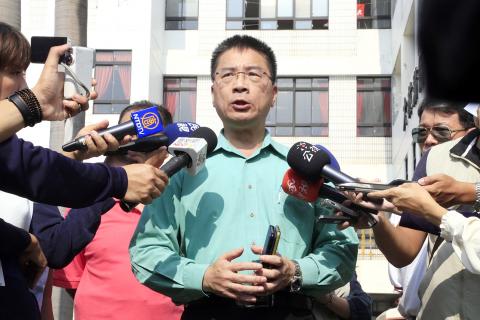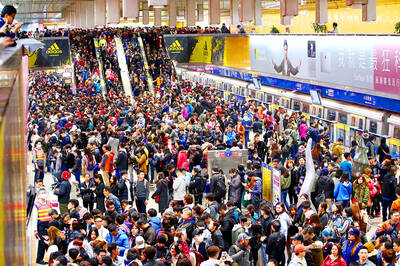The Cabinet is to hold two public hearings on lifting a ban on food product imports from four Japanese prefectures, Cabinet spokesman Hsu Kuo-yung (徐國勇) said yesterday.
Public hearings on the issue are to be held in Taipei and Kaohsiung next month, Hsu said, adding that the Cabinet wants the hearings to be broadcast live on TV, but it has yet to work all the details out.
The exact time, venue and other details will be announced at a Cabinet meeting tomorrow, Hsu said.

Photo: CNA
The remarks follow a report published in the Chinese-language United Daily News yesterday which said that in order to avoid giving the public the impression that the government is seeking to hold the promised three extra public hearings on the issue in a hasty manner, the Presidential Office and the Cabinet had reached an agreement to postpone the hearings.
Food imports from Fukushima, Ibaraki, Tochigi, Gunma and Chiba prefectures were suspended on March 25, 2011, due to fears that the areas might have been contaminated by radiation after the Fukushima Dai-ichi nuclear power plant disaster.
The government is now considering lifting a ban on food products from four of the prefectures — excluding Fukushima — but has met with into heavy opposition.
Earlier this week, the Cabinet announced a four-point principle for a partial ban on products from four of the prefectures if a complete ban is lifted.
The Cabinet plans to maintain a complete ban on foods produced in Fukushima Prefecture, as well as tea, water, infnt formula and wild aquatic products from Ibaraki, Tochigi, Gunma and Chiba prefectures.
Food items from four of the prefectures would require certificates of radiation inspection and origin, while products prohibited in Japan and the US would remain banned in Taiwan.
After announcing the public hearings on Nov. 10, the Cabinet held 10 meetings on the safety of Japanese food products across Taiwan from Nov. 12 to Monday last week, but critics said the hearings were hastily announced and that they were essentially conducted for show, to pave the way for lifting the ban.
Some of the hearings have ended in chaos amid protests.
Questions were raised about why the government seemed to be in such a rush to hold the hearings.
Other objections and suspicions have surfaced, including concerns that Japan is looking to dump unwanted food products in Taiwan.
The Cabinet’s Food Safety Office yesterday said that a forum on the issue with civic groups scheduled for Tuesday would continue as planned.
The office said that it has held regular meetings with civic groups since July to consult with them over food safety issues.
It held a meeting on Japanese food imports with the groups on Nov. 8, but as too many questions were raised it was decided to hold another seminar on Tuesday on the same issue.
The meeting on Tuesday is to focus on making information on food products at border inspections public, inspection methods, and domestic and foreign criteria for importing food from the Japanese prefectures.

People can take the Taipei MRT free of charge if they access it at Nanjing Sanmin Station or Taipei Arena Station on the Green Line between 12am and 6am on Jan. 1, the Taipei Department of Transportation said on Friday, outlining its plans to ease crowding during New Year’s events in the capital. More than 200,000 people are expected to attend New Year’s Eve events in Taipei, with singer A-mei (張惠妹) performing at the Taipei Dome and the city government’s New Year’s Eve party at Taipei City Hall Plaza, the department said. As people have tended to use the MRT’s Blue or

Civil society groups yesterday protested outside the Legislative Yuan, decrying Chinese Nationalist Party (KMT) efforts to pass three major bills that they said would seriously harm Taiwan’s democracy, and called to oust KMT caucus whip Fu Kun-chi (傅?萁). It was the second night of the three-day “Bluebird wintertime action” protests in Taipei, with organizers announcing that 8,000 people attended. Organized by Taiwan Citizen Front, the Economic Democracy Union (EDU) and a coalition of civil groups, about 6,000 people began a demonstration in front of KMT party headquarters in Taipei on Wednesday, organizers said. For the third day, the organizers asked people to assemble

Taipei is participating in Osaka’s Festival of Lights this year, with a 3m-tall bubble tea light installation symbolizing Taiwan’s bubble tea culture. The installation is designed as a bubble tea cup and features illustrations of Taipei’s iconic landmarks, such as Taipei 101, the Red House and North Gate, as well as soup dumplings and the matchmaking deity the Old Man Under the Moon (月下老人), affectionately known as Yue Lao (月老). Taipei and Osaka have collaborated closely on tourism and culture since Taipei first participated in the festival in 2018, the Taipei City Department of Information and Tourism said. In February, Osaka represented

Taiwanese professional baseball should update sports stadiums and boost engagement to enhance fans’ experience, Chinese Professional Baseball League (CPBL) commissioner Tsai Chi-chang (蔡其昌) told the Liberty Times (sister paper of the Taipei Times) in an interview on Friday. The league has urged Farglory Group and the Taipei City Government to improve the Taipei Dome’s outdated equipment, including relatively rudimentary television and sound systems, and poor technology, he said. The Tokyo Dome has markedly better television and sound systems, despite being 30 years old, because its managers continually upgraded its equipment, Tsai said. In contrast, the Taipei Dome lacked even a room for referees